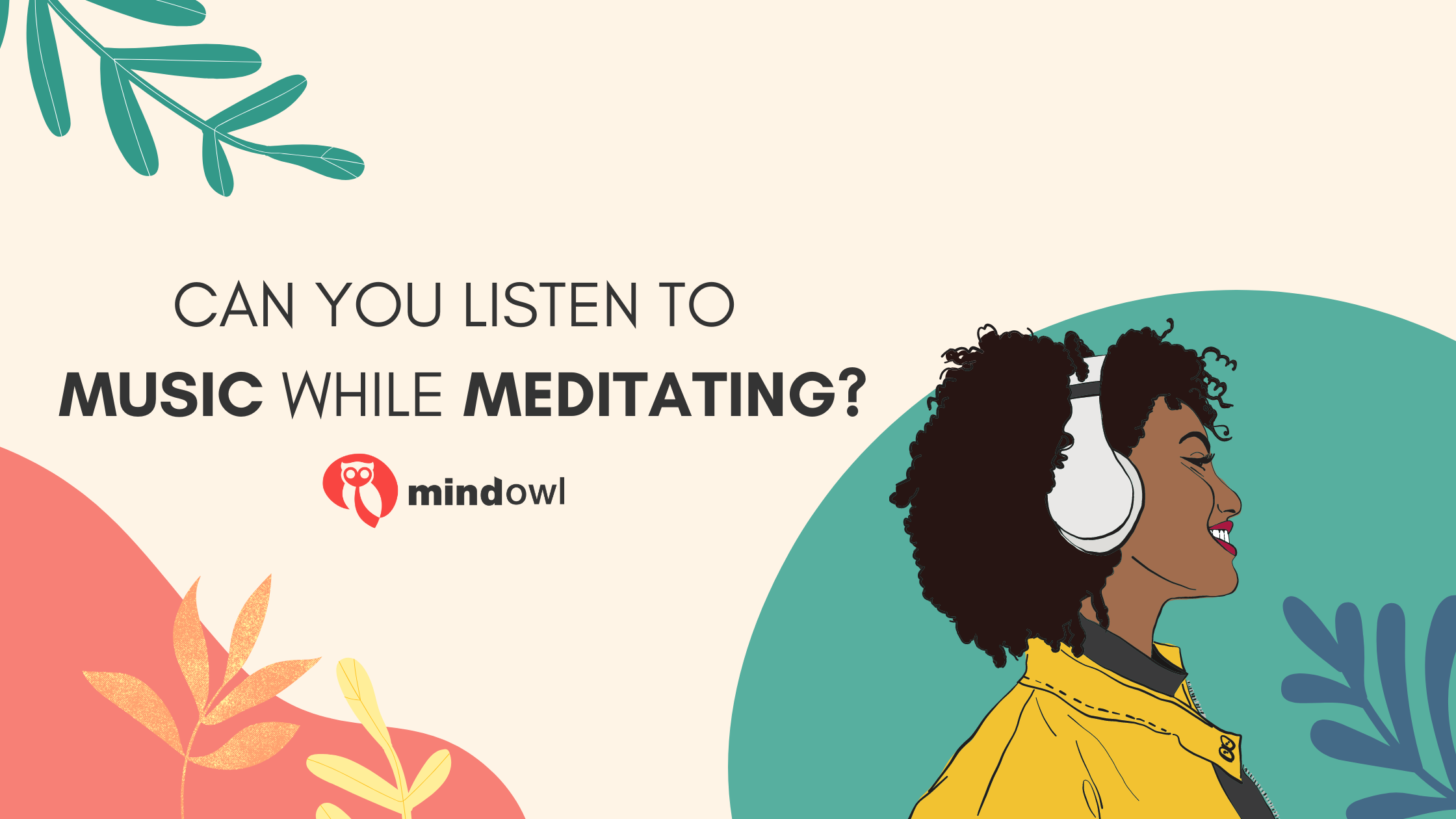The power of music is undeniable. Both listening to music and playing it yourself can bring intense joy, reduce stress, help us focus on the present moment, and relieve anxiety or insomnia. You may notice that these are also some of the key benefits of meditation. The powerful surges of energy and feeling that happen when listening to music have a lot in common with meditation’s goal of expanding sensual and emotional experience. So why do some experienced meditators say you shouldn’t listen to music while practising?
Is it possible to meditate while listening to music?
Traditionally speaking, the idea of listening to music during meditation would be out of the question. This is a very modern idea that has no origin in Zen Buddhism or other early forms of meditation. Generally, meditation would be an extremely quiet practice, and incorporating music might get in the way of some people’s idea of “true meditation”.
However, this isn’t to say that meditating with background music or noise isn’t possible, or that it has no links with traditional practice. The earliest meditation sessions would have taken place outside, where natural sounds were unavoidable. In fact, part of being in the present moment is about listening to, embracing and accepting all the things you can hear and feel around you, and trying not to get frustrated by external noise.
One of the ways we can involve music in our practice of meditation is by considering where we anchor our attention. Mindfulness meditation often uses the breath as the anchor; however, music can represent an alternative anchor. By focusing on particular elements of the music we are listening to and bringing our attention back to these sounds each time our minds wander, we can make musical accompaniment a useful addition to our sessions.
So, what is there to gain from meditating with music? Ultimately, it comes down to the individual, as all experiences of meditation do. Let’s take a look at the potential advantages and disadvantages of incorporating music into your meditation practice.

and bringing our attention back to these sounds each time our minds wander, we can make musical accompaniment
a useful addition to our sessions.”
What are the benefits of listening to music while meditating?
There are a wide range of benefits people associate with listening to music while meditating. The fact that popular meditation apps such as Headspace and Breethe have dedicated areas for music listening highlights the potential positive effects of background music. Here, we’ll consider some of the advantages cited most often.
Stress reduction
Listening to soft, calming music during meditation can seriously reduce your stress levels. It’s vital that we all look after our mental health, and cultivating emotional balance and a calm mind is a key part of that. Music can help produce a meditative mental state, which is proven to provide stress relief and lower blood pressure.
Greater insight
One popular goal of meditation is insight, something that we all know music is capable of providing. Listening to music while you practise allows you to consider your relationship with that music as a means of self-discovery. Insight can turn an ordinary experience into a profoundly satisfying one, by opening you up to how your conscious mind operates.
Increased focus on the present moment
Neuroscience shows that listening to music has similar effects to meditation. It’s impossible to fully access and interpret a song without listening closely for its entire duration. This focus on the present moment contains strong parallels with the fundamental principles of mindfulness meditation.
Resist negative mind-wandering
One of the benefits of music is that it helps us combat the negative effects of the default mode network, which causes us to worry and ruminate on the past and future, rather than the present. Scientific research has shown that while music activates the waking rest state of the default mode network, it sucks us in fully, and stops us from experiencing negative mind-wandering. This can help us achieve greater peace of mind.
Which meditation styles can you practise with music?
Is listening to music while meditating a good idea? The answer often depends on what type of meditation you’re practising. Some styles of meditation involve listening to an audio recording, while others require complete silence. On the other hand, some types of practice can benefit from the kind of external stimulation that music provides.
There are certain types of meditation you should avoid incorporating music into. Mantra Meditation, for instance, requires the vocal repetition of a mantra, something that may be difficult with the added distraction of music. Similarly, guided meditation, in which you listen to the notes and instructions of a meditation leader, doesn’t exactly lend itself to pumping out your favourite tunes.
However, some practices can work well with musical accompaniment. Incorporating music into unguided mindfulness meditation can give you greater access to your thoughts and sensations during practice. Our article on why meditation is more than just relaxation highlights the importance of gaining insight into ourselves and others – and what in life provides better insight than music? Another practice which background music can work well with is Movement meditation, which allows you to be mindful of bodily motions and postures. Try turning on some calming, sensual music, closing your eyes and allowing yourself to move freely, noting your experiences and how you feel after. This can be an ideal combination of music and meditation.

can give you greater access to your thoughts and sensations during practice.”
What should I listen to when meditating?
Because of how varying our experiences of music are, the types of music which can aid meditation are highly subjective. For some people, upbeat music like Motown or house might sound like the worst idea ever during meditation, but for others, it could be perfect for amplifying one’s sense of concentration. Ultimately, you need to be doing whatever encourages or supports you.
This Stylecraze article on the benefits of meditation recommends some particularly good styles of music to listen to during meditation. These include Indian Classical Music, Gregorian Chanting (a kind of baritone singing), Primordial Sounds (such as “ohm”), minimalist instrumental music, or choral singing.
Many people also like to meditate to the sounds of nature. Using recordings of nature sounds like waterfalls, the sea, or birdsong as an auditory accompaniment to meditation aligns with the idea that traditional Buddhist meditation practice would take place outdoors, where these sounds naturally occur anyway. These types of sounds are less likely to distract you from your meditation, and they may help your sessions feel more natural than they would if you were to practise in silence.
It’s worth emphasising that meditating doesn’t mean not listening to anything. During meditation, it can actually be useful to notice the sounds happening naturally around you, such as a dog barking, a car driving by, trees blowing in the wind, or people chatting.
Tips for incorporating music into your practice
As we’ve discussed, meditation music should depend on your personal preferences, as different things work for different people. That being said, there are a few general tips and ideas that are worth bearing in mind.
Use instrumental music
Instrumental pieces with high audio quality are usually best. Classical music or soft, jazzy recordings can often increase concentration, presence, and relaxation. Meanwhile, listening to songs with lyrics can distract you, and potentially get your mind racing, so instrumental pieces are generally more effective.
Focus intently on the music
Rather than getting caught up in the thoughts generated by listening to music, focus your mind on the music itself. Try to identify different musical components such as instruments, melodies, or digital effects. This allows you to use music as the meditation.
Pick the right meditation style
Make sure you pick a meditation style that music can work alongside. Insight meditation and movement meditation are good examples, as we discussed. Avoid practices like Mantra meditation that will require you to start multi-tasking. To find out more about various different forms of meditation, check out our article on the six main types of practice.
Be aware that music may cause distraction
Music has the potential to distract from our breathing and take our minds away from the deep reflection meditation helps generate. According to meditation expert Diana Winston, music “can bring on imagery and memories and associations, and in mindfulness, we’re actually trying to stay in the present moment and avoid going down those roads”. It’s important to understand that it may not work for everyone.
Don’t use music as a crutch
Some people argue that meditation music is a crutch which prevents us from getting the full benefits of meditation. The pleasant feelings provoked by music can be a substitute for reaching deeper within ourselves to find a more personal source of happiness.
Becoming dependent on music for being present can actually hold you back, because you want to be able to be present whatever the circumstances. Rather than risk detracting value from your meditation, it could be useful to use music as a totally separate form of meditation. You may have heard of mindful walking or washing the dishes; why not treat music in the same way? Let it become the object of your meditation and listen with an enhanced sense of awareness. Focus your whole attention on it, sitting comfortably, perhaps darkening the room, and tuning into the music totally.

Why not give it a try?
Some advocates of traditional meditation may view music as a distraction from the mindfulness and clarity that meditation seeks to achieve. However, this doesn’t mean you shouldn’t find out whether or not it works for you.
We’ve been over some of the benefits that music meditations can offer, which include relaxation, mood enhancement, and an overall greater sense of oneness with the universe. Both music and meditation release the chemical dopamine, and can cause a powerful positive shift in our mental state and prompt richer emotional experiences. So there is definitely a logic in trying to combine the two.
We’ve also considered what type of music you could use. Although, while there are some forms of music that lend themselves more naturally to meditation, don’t rule out trying alternatives. The Zen practice of Beginner’s Mind means letting go of preconceptions in life and in meditation; this frame of mind can be applied to our experience of music in meditation. Do you want to listen to heavy metal while meditating? Does it work for you? Then do it! It’s wrong to think that you can only meditate while listening to relaxing music. Just remember not to use music as a crutch. While it can be an interesting and useful alternative to traditional mindfulness meditation, it’s important to build up your confidence practising independently, and relying on background music can prevent you from doing this.
MindOwl Founder – My own struggles in life have led me to this path of understanding the human condition. I graduated with a bachelor’s degree in philosophy before completing a master’s degree in psychology at Regent’s University London. I then completed a postgraduate diploma in philosophical counselling before being trained in ACT (Acceptance and commitment therapy).
I’ve spent the last eight years studying the encounter of meditative practices with modern psychology.


